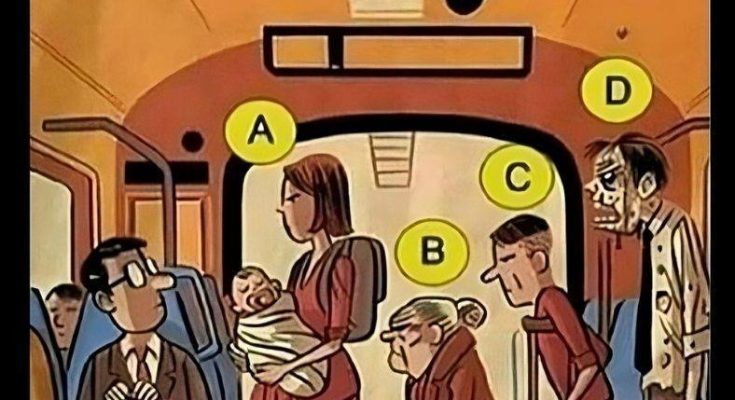Every decision you make, no matter how small, offers a window into your personality. Imagine being on a crowded bus and seeing several people who might need your seat more than you do. Whom would you choose to help? This seemingly simple decision can say a lot about who you are as a person. So, let’s break down this personality test based on whom you’d give your seat to, and uncover what your choice might reveal about your character.
Understanding the Psychology Behind This Personality Test
Before we dive into the specifics of each choice, let’s consider why this test is effective. Our actions often reflect our core beliefs, values, and instincts. In real life, situations that require empathy, quick thinking, or moral judgment can be revealing. Even a seemingly mundane decision, like offering your seat, can uncover deeper traits that shape how you interact with the world.
This test presents four individuals:
A mother holding her baby,
An elderly woman,
A man on crutches,
A sick man.
Now, let’s explore each choice and what it reveals about you.
Option A: Giving Your Seat to the Mother Holding Her Baby
If you would give your seat to the mother with her baby, it suggests that you have a warm, sociable, and compassionate nature.
What This Says About You
You’re the type of person who finds joy in helping others and offering support. You often feel a natural pull toward nurturing those around you, especially when it comes to vulnerable individuals like children or new mothers. Your kindness is matched by a deep desire to avoid conflict, preferring to maintain peace even when it means making sacrifices.
Strengths and Weaknesses
Strengths: Empathy, understanding, and a cheerful disposition. You bring positivity to your environment and are often seen as approachable and easygoing.
Weaknesses: Sometimes, your desire to avoid confrontation can make it hard for you to assert your needs or opinions. You might also struggle with saying no, even when it’s necessary.
Option B: Giving Your Seat to the Elderly Woman
If you choose to offer your seat to the elderly woman, you’re likely a detail-oriented and thoughtful person who values tradition and respect.
What This Says About You
Your decision reflects a strong sense of duty, rooted in traditional values like respect for elders. You think carefully before making decisions, often analyzing the consequences thoroughly. You believe in upholding what’s right, and you often take a perfectionist’s approach to problem-solving.
Strengths and Weaknesses
Strengths: Reliable, dependable, and loyal. You’re someone others trust for wise advice, and your ability to analyze situations carefully helps you navigate life effectively.
Weaknesses: Your conservative approach may make you resistant to change. You can be stubborn, finding it hard to accept new ideas or approaches. You value your own opinions highly and might be reluctant to take advice from others.
Option C: Giving Your Seat to the Man on Crutches
If you would give your seat to the man on crutches, it suggests that you are a spontaneous, instinct-driven individual who thrives on helping others without overthinking it.
What This Says About You
You’re a person who acts quickly, driven by your gut feelings rather than calculated decisions. You’re comfortable facing the unexpected, and you rarely hesitate when it comes to offering a helping hand. Your instinctual behavior makes you adaptable and open to new experiences, as you prefer to take life as it comes.
Strengths and Weaknesses
Strengths: Spontaneous, resilient, and full of energy. Your positive approach to life’s challenges makes you an inspiration to others, and you’re often seen as courageous and fearless.
Weaknesses: Acting on impulse means you might overlook potential risks or consequences. While your spontaneity is often a strength, it can sometimes lead to impulsive decisions that aren’t well thought out.
Option D: Giving Your Seat to the Sick Man
If you offer your seat to the sick man, it indicates that you have a strong, assertive personality combined with a deep sense of responsibility toward others.
What This Says About You
You have a no-nonsense approach to life, and you’re not afraid to take bold actions when you see someone in need. Your desire to help those who appear to be in the most immediate distress highlights your straightforward nature. However, while you’re quick to lend a hand, you are also cautious about whom you trust and let into your inner circle.
Strengths and Weaknesses
Strengths: Direct, assertive, and strong-willed. You have a clear sense of justice and often fight for what you believe is right. Your courage inspires respect and admiration from others.
Weaknesses: Your guarded nature means that you can be slow to trust, making it hard for others to connect with you on a deeper level. Once someone loses your trust, it’s difficult for them to earn it back.
How to Use This Insight for Self-Improvement
Now that you’ve identified which choice aligns with your instinct, how can you use this insight for personal growth? Recognizing the strengths and weaknesses tied to your decision-making process is the first step in understanding yourself better. You can leverage your strengths while being mindful of areas that need improvement.
For example:
If you’re a sociable and kind-hearted person, learn to establish boundaries to protect your well-being.
If you value tradition and careful analysis, try to embrace change and new ideas to expand your perspective.
If you’re spontaneous and instinctual, find ways to balance your boldness with a bit more planning when needed.
If you’re assertive and strong-willed, work on opening up to others, allowing yourself to be more vulnerable.
Conclusion: What Your Choice Says About You
Who you would give your seat to on the bus might seem like a simple decision, but it offers a powerful glimpse into your personality and values. Whether you are nurturing, traditional, spontaneous, or strong-willed, your choice reveals key traits that shape how you interact with the world.
This personality test isn’t just about understanding who you are—it’s also about using that awareness to grow. Each of us has unique strengths that define us, as well as areas where we can improve. So, the next time you’re faced with a choice, think about what it reveals about you, and use that knowledge to enhance your personal journey.
Remember, every choice you make is a reflection of your inner self. What will your next decision say about you?



